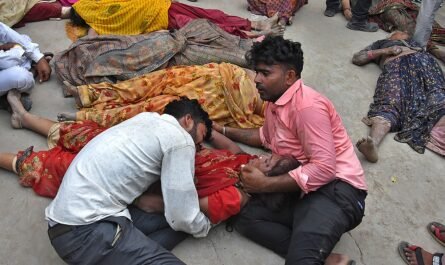Protesters returned to the streets of Kenya on Thursday, some of them demanding the resignation of President William Ruto, despite his announcement a day earlier that he was abandoning a tax bill that drew large-scale demonstrations in which nearly two dozen people were killed.
The crowds in Nairobi, the capital, were much smaller than those on Tuesday, when tens of thousands of protesters flooded into the city center as lawmakers debated and then passed the contentious legislation. That demonstration turned violent as people stormed the building and set parts of it ablaze, and rights groups say that at least 23 people were killed and more than 300 others injured as the police used tear gas and bullets against them.
On Thursday, a heavy police and military presence was visible across the capital, with officers in cars and trucks and on horseback guarding the roads leading to Parliament, the president’s official residence and several downtown streets. Much of the central business district remained closed as police officers chased and tear-gassed smaller crowds waving white roses. Protests continued until evening in some neighborhoods in Nairobi.
Some activists and opposition political leaders had urged demonstrators not to march toward the president’s official residence in Nairobi on Thursday for fear of more bloodshed. But others said the killings, shootings and abductions in recent days — which activists said were some of the bloodiest in Kenya’s recent history — would not deter them from pushing Mr. Ruto to resign.
“We will be in these streets until Ruto goes,” said John Kimani, 25, who was protesting in Nairobi. “No one can tell us otherwise.”
In Eldoret town, Mr. Ruto’s stronghold, dozens of young men carrying wooden batons, bows and arrows demonstrated in support of the president. One carried a placard that read, “Warning: Protest at your risk.”
Until Mr. Ruto’s announcement on Wednesday that he would not sign the finance bill, the president had defended the measure as necessary for raising revenue and staving off debt default for a country whose government owes billions of dollars to its creditors.
As demonstrators gathered on Tuesday for what they called “Occupy Parliament” and some breached the legislative building, Mr. Ruto called their activities “treasonous” and said he would deploy the military to support the police in quelling the protests.
On Thursday, Kenya’s High Court ruled that the deployment of the military was necessary to assist the police but called for the government to provide the terms and duration of the engagement within two days.
“The president has not respected the general will of the people,” said Jimmy Magero, a protester in Kisumu, an opposition bastion along Lake Victoria. “He cannot rule over us by force if we say enough is enough.”
The youth-led protests in Kenya began last week, with opponents arguing that the bill would drastically escalate the cost of living. Even when Mr. Ruto’s governing coalition removed some of the proposed new taxes, many activists and Parliament’s opposition lawmakers rejected the bill.
The government’s spokesman, Isaac Mwaura, called on Kenyans to stop marching in the streets on Thursday. “Let’s not aid those who don’t wish our country well by staging protests to destabilize us,” he said in a statement. “Kenya is the only country that we have.”
But many were not deterred.
In Kisumu, dozens of protesters tried to reach the president’s residence but were rebuffed by the police. Most shops in central Kisumu were closed as traffic ground to a halt and the police put up barricades to prevent demonstrators from gaining access to some main streets.
Similar protests broke out in the port city of Mombasa, where demonstrators chanted, “Ruto must go.” Protesters also blocked the Migori-Kisii highway in the country’s west, burning tires and throwing stones at the police.
About 50 young Kenyans had been abducted by Wednesday, according to the Law Society of Kenya. By Thursday, some of those abducted had been released by law enforcement officials, but several others have gone missing, said the Law Society president, Faith Odhiambo.
The country’s deputy president, Rigathi Gachagua, has blamed the spiral of violence on the National Intelligence Service. He said on Wednesday evening that the agency did not properly brief the president on the anger on the streets, and called on its director, Noordin Haji, to resign.
Detractors have also pointed out that Mr. Ruto was a deputy president in the previous government, which saddled Kenya with so much debt.
Altogether, Kenya owes some $39 billion to foreign and commercial lenders. Protesters have specifically directed their ire at the International Monetary Fund, which has lent more than $3 billion to the East African nation and has, in turn, recommended that the government raise taxes and cut spending.
Representative Ilhan Omar, Democrat of Minnesota, echoed similar sentiments on Wednesday, saying the I.M.F.’s recommended “austerity conditions have contributed to the economic hardships facing Kenyan citizens.”
With protesters promising to continue flooding the streets, analysts say that Mr. Ruto faces an emboldened public that is determined to see more tangible changes.
“The finance bill was the final straw,” said Kathleen Klaus, an associate professor at Uppsala University in Sweden who has studied political violence in Kenya. The legislation, she added, “has provided a clear event and a set of demands around which to organize peaceful resistance.”
Odera Wycliffe contributed reporting from Kisumu, Kenya; Mohamed Ahmed from Mombasa, Kenya; and Jimmy Gitaka from Eldoret, Kenya.




